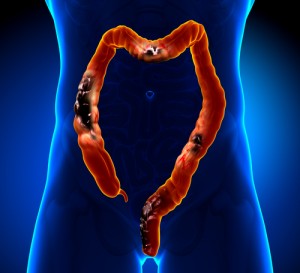 A recent pivotal study associates inflammatory bowel diseases, like Crohn’s disease (CD) and ulcerative colitis (UC), to changes in the variety of viruses in the gut. The study, entitled “Disease-Specific Alterations in the Enteric Virome in Inflammatory Bowel Disease” was published in Cell by Jason M. Norman part of Dr. Herbert W. Virgin’s group at Department of Pathology and Immunology, Washington University School of Medicine, and colleagues.
A recent pivotal study associates inflammatory bowel diseases, like Crohn’s disease (CD) and ulcerative colitis (UC), to changes in the variety of viruses in the gut. The study, entitled “Disease-Specific Alterations in the Enteric Virome in Inflammatory Bowel Disease” was published in Cell by Jason M. Norman part of Dr. Herbert W. Virgin’s group at Department of Pathology and Immunology, Washington University School of Medicine, and colleagues.
The role of the microbiome in the pathogenesis of inflammatory bowel diseases, obesity, diabetes and metabolic syndrome has been increasingly recognized for the last few years. Several studies have shown that inflammatory bowel diseases are linked to a decrease in the diversity of bacteria in the gut. Particularly, a decrease in the diversity of enteric bacterial populations has been observed in patients with Crohn’s disease (CD) and ulcerative colitis (UC).
According to the Centers for Disease Control and Prevention, inflammatory bowel diseases affect approximately 1 million individuals in the U.S. In Crohn’s disease and ulcerative colitis it seems that if the immune system targets the intestine tissue, there is weight loss, bleeding in the gut and rectum, and loss of appetite. Normally, the strategy to treat Crohn’s disease is by removing part of the bowel. Therefore a better knowledge of the pathogenesis of these diseases will improve their prevention and treatment.
In this study, the research team showed that patients with Crohn’s disease (CD) and ulcerative colitis (UC) had a higher variety of viruses in their digestive track than healthy volunteers, suggesting that viruses probably have a role in the pathogenesis of these diseases.
“A significant portion of the viral DNA we identified in these patients is unfamiliar to us — it comes from newly identified viruses we don’t know much about. We have a great deal of groundwork to do, including sequencing the genetic material of these viruses and learning how they interact with the gut and gut bacteria, before we can determine if changes in the virome cause these conditions or result from them,” said Dr. W. Virgin, in a press release.
The researchers analyzed three groups of patients with Crohn’s disease or ulcerative colitis living in Chicago, Boston and the United Kingdom. They isolated the viral DNA from the feces of these patients and healthy controls living in the same areas or homes and compared the purified viral DNA, and found that the viral DNA from CD and UC individuals were associated with a significant proliferation of Caudovirales bacteriophages when compared with the control group. Notably, it seemed that this proliferation and diversification of the enteric virome was not due to alterations in bacterial populations. These findings suggest that alterations in the virome may contribute to intestinal inflammation and bacterial dysbiosis.
“Much of the increased viral diversity in participants with inflammatory bowel diseases was in the form of bacteriophages, which are viruses that infect bacteria and can incorporate themselves into the bacteria’s genetic material,” said Dr. Virgin. Dr. Virgin went on to explain that these bacteriophages may come either trough dying bacteria that release them or through the diet or a combination of these two factors.
The researchers stated that for the development of new therapies for inflammatory bowel diseases a better understanding of the interaction between gut microbiome, virome and human genes is needed.
“We know that mutations in human genes affect the risk of inflammatory bowel diseases, and scientists also are exploring how bacterial genes may influence risk,” said Dr. Virgin. “Our results show that the virome’s potential effects on the gut also need to be a part of these investigations,” he concluded.
Currently, the researchers are establishing an animal model of inflammatory bowel diseases to assess if genes from human, bacterial or viral or a combination of them contribute for the development of these diseases.

